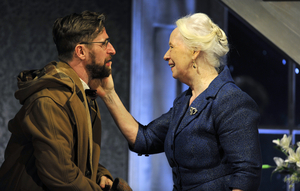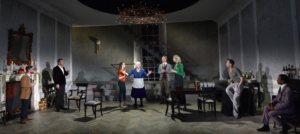Review: Falling Faintly on the EPIPHANY

As a dinner party haunted by absences draws to a close, Morkan, the evening's irrepressible host, stumbles to a confession. "It's just that life has felt so wobbly," she says, pointedly avoiding eye contact with any of her guests. "I feel dislocated...exiled...and I'm not sure why... and maybe that's the world".
In Brian Watkins' new play Epiphany, Morkan's concerns underscore the anxieties felt by her party guests who have gathered in the huge drawing room of a Georgian house as snow falls outside.
As the characters' confusion about why they were invited to the party and their comically inept efforts to explain the tradition of the Epiphany (the Christian feast day marked on January 6th) unfurls, it anticipates their personal and collective uncertainty.
A character's suggestion that "we are living in a thought-tormented age" is language borrowed from the novella that inspired the play: James Joyce's The Dead. But where Joyce's work explored Irish identity, Watkins' Epiphany focuses on a globalized world: the characters are a mix of American, English, and Irish and the action is set in an unspecified city.
 Discommoded by Morkan's insistence that they surrender their mobile phones for the evening, the characters' allude to contemporary political crises while grappling with existential questions about the challenges of finding meaning in life, the consequences of living in a world dominated by empiricism ("All minutes are not equal," cautions the adrift Ames), and the complications of making comparisons between the present and the past.
Discommoded by Morkan's insistence that they surrender their mobile phones for the evening, the characters' allude to contemporary political crises while grappling with existential questions about the challenges of finding meaning in life, the consequences of living in a world dominated by empiricism ("All minutes are not equal," cautions the adrift Ames), and the complications of making comparisons between the present and the past.
This might suggest an arid, po-faced gathering, but that that would be a gross misrepresentation. Watkins harnesses rich comedy in the way he introduces the arriving guests to the audience, his gentle mocking of their pretentions, and how he flings the characters' weighty, considered deliberations against raucous slapstick comedy.
Complemented by Francis O'Connor's ambitious set - resonant with a faded grandeur - that uses two staircases to situate the action in an in-between place, Druid's production is deftly-choreographed and marked by flawless ensemble playing.
Garry Hynes's fluid direction marshals uniformly strong performances that balances technical adeptness - the script's dialogue mimics how we speak with characters frequently talking over each other - with striking tableaux, such as when the expressions on the characters' faces are transfixed by a moving delivery of the song The Lass of Aughrim.
Often literally center stage, Marie Mullan's essays a bravura depiction of the intense, almost unhinged, ring leader-like Morkan. As her put-upon assistant Loren, Julia McDermott offers a spirited performance that vigorously articulates a millennial's worldview. In a nuanced, beautifully-observed turn, Aaron Monaghan spotlights alcoholic Freddy's incorrigible awkwardness.
But the production can't mask the occasional jarring notes of Watkins' writing. The script's tonal shifts can feel jagged and a significant reveal near the play's end is unconvincing.
For the most part, though, Epiphany is a compelling, assured portrait of believable, disoriented characters who are fitting successors to Joyce's Gabriel Conroy who, famously as he recognized the preciousness of life, "heard the snow falling faintly through the universe and faintly falling, like the descent of their last end, upon all the living and the dead".
Epiphany runs at the Townhall Theatre, Galway, until July 27 as part of the Galway International Arts Festival. See druid.ie and giaf.ie.
Photo credit: Robbie Jack
Reader Reviews

Videos

